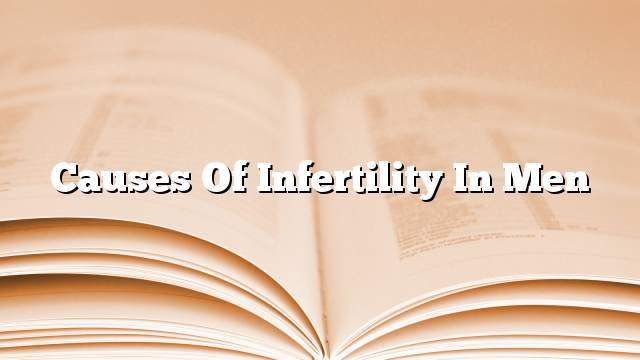35% of the causes of infertility in general are attributed to men and men share women 25% of other causes, ie men constitute about half of the causes of infertility. Hence the need for men and women to be together during the clinic at the specialist doctor.
The basic information to be taken from the man at the time of the examination is to determine the complete clinical history followed by a clinical examination and then to request the necessary tests, the most important of which is the semen examination.
If the first examination of a man is a semen examination where he gives a clear idea of the man’s ability to fertilize.
Before we list the reasons for the inability to have a child, we have to mention the reproductive system of the man, there are testicles and crotch and sperm. Here we should not forget that glands are important, especially the pituitary gland, which controls the production of testicles. A decrease in the production of FSH hormones, LH from the pituitary gland affects production and there is a defect in the semen and treat it is simple by giving hormones alternative.
Either of the reasons that relate to the testicles may begin from childhood or at birth where they do not get into the scrotum (ie testicles migrating) and keep them for a long time without treatment leads to damage to the testicles and lead in the future to infertility.
the cure:
Surgical treatment in the first year after birth to put the testicles in place and try to avoid damage to the testicles.
Another reason we often hear about varicose veins is that it is still controversial as to how it affects semen in terms of number, movement or sperm shape.
Recent research does not encourage varicose veins in all cases but in special cases determined by a fertility specialist if he is a child.
In the field of testicular also, the injury of severe inflammation, “perhaps neglected treatment before” leads to damage and this affects the number and movement and shape of sperm.
There is a word about that if we take into account the number: Research has shown that less than 20 million sperm in every million of sperm leads to a negative impact on the ability to reproduce, for example, if the number between 10-20 million, Women’s uterus may help to conceive. If you have less than 5 million sperm, you should think seriously about other ways, such as IVF.
As for the number, the movement and shape of sperm as the less movement and the proportion of natural forms the lower the ability of this animal to vaccinate the egg and the occurrence of pregnancy. And here we must only resort to the way of the children of the tubes in which the solution, which in many cases happy patient and doctor together.
An important cause of male infertility is the lack of sperm in sperm. This is the result of either blockage of the epididymis or semen as a result of previous inflammation or congenital or non-composition of sperm from the testicle from the ground. To simplify things, the testicles resemble the factory and the bully in the store. If the factory is idle the store … also.
Treatment In the case of blockage sperm are withdrawn from the epididymis or from the testicles (this is an easy process that does not take more than minutes and under local anesthesia). The sperm is then carried out and performed in vitro.
If it is proved that there is no obstruction in the absence of semen from the liquid, a small biopsy of the testicles tissue is taken and the attempt to remove one or more sperm cells and use it to inject the egg microscopically to form a child, , this is a small but technically significant process in its effect and results. This method was used about ten years ago and brought happiness to hundreds of homes and joy to many couples who never expected to have children, it proves that there is no despair or despair of the mercy of God.
Finally, certain guidelines should be given to try to avoid certain factors that help reduce the number of sperm:
1. Stay away from smoking and drink heavily.
2. Keep away from high heat sources.
3. Do not wear tight underwear.
4. Non-exposure to chemicals such as factory workers (affecting sperm cells)
Science is still progressing and success is still waiting for the few that remained without reaching a solution to their problems. But I stress that the jumps in the last 10 years, especially to treat male infertility, have been high leaps and we are waiting for more, and hope has no limits.
